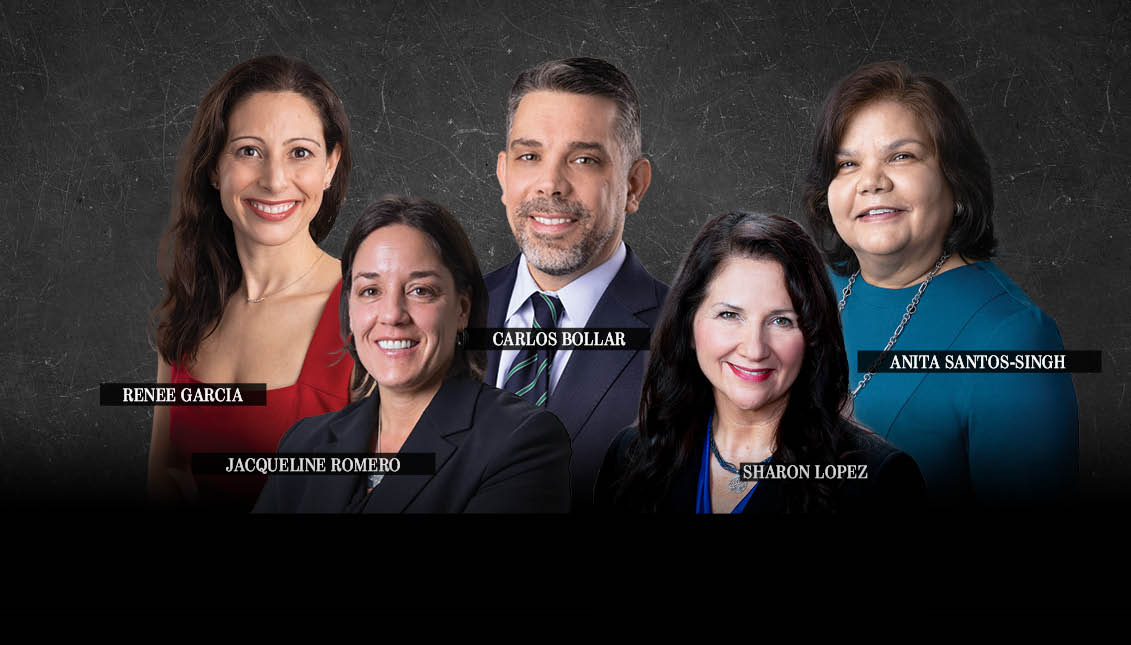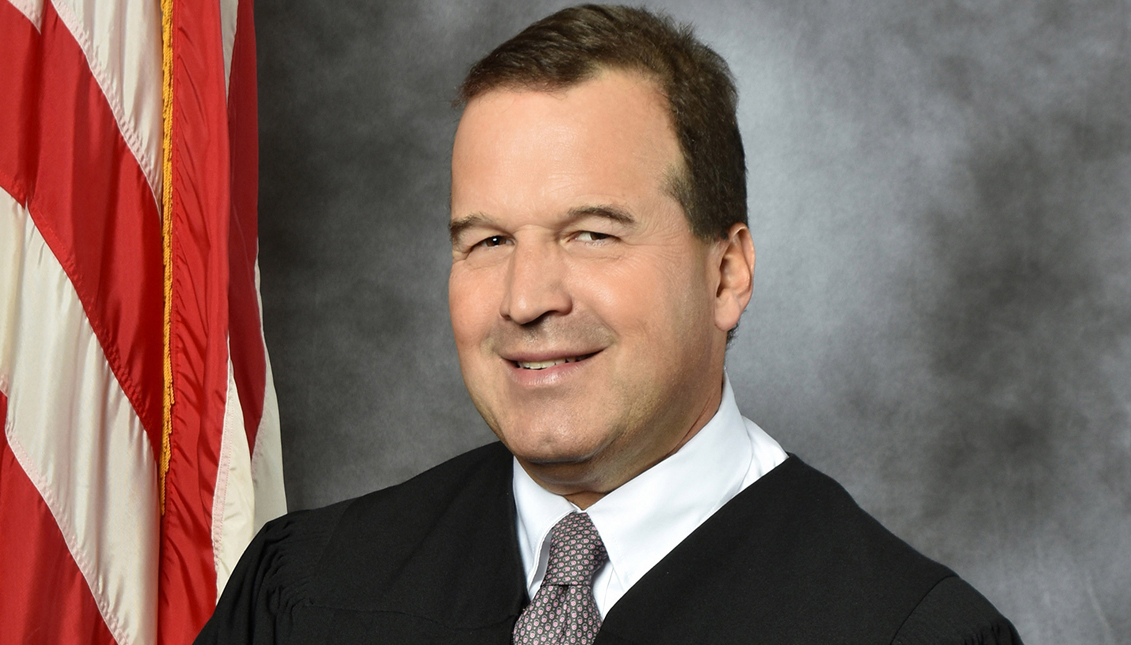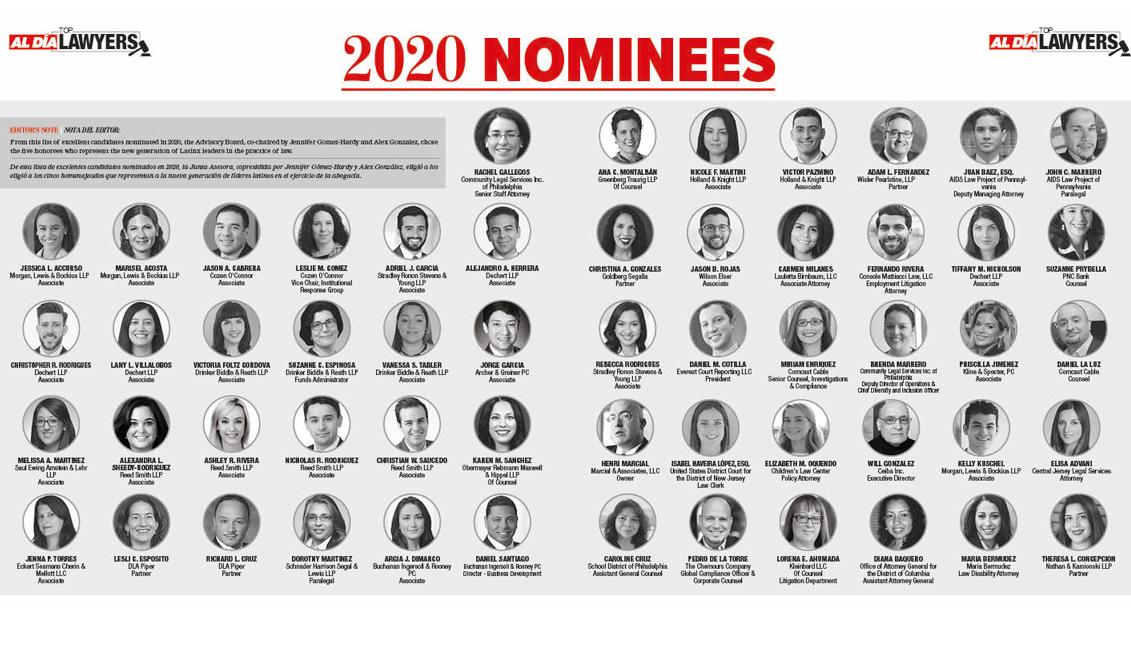
 's 2020 Champions of Justice
's 2020 Champions of Justice
AL DÍA’s 2020 Top Lawyers forum honors five Latino lawyers leading the way for the next generation in law.
Just one month after AL DÍA’s 2020 Hispanic Heritage Awards, we are hosting another virtual event to honor some of the Philadelphia region’s top Latinx champions of justice.
For the past two years, AL DÍA’s Top Lawyers Forum has recognized these individuals not only for their exceptional work in law and as leaders to inspire the next generation of Latinx lawyers.
The 2020 AL DÍA Top Lawyers Forum will be virtual because of the COVID-19 pandemic but is poised to pack the same excitement and inspiration for all who tune in.

This year, Pennsylvania’s first-ever Latino judge, the Honorable Nelson Diaz, will be the recognized recipient of the Gus Garcia Lifetime Achievement Award for his career in law that spans more than 40 years.
“History doesn’t tell you. Success has many fathers, so everybody takes credit for stuff that us Latinos have been able to do in this country,” Diaz said during an interview with AL DÍA. “If you don’t write it, you don’t tell it, no one’s ever going to know.”
Diaz was the first Puerto Rican to attend and graduate Temple Law School, and the first Latino lawyer to pass the Pennsylvania Bar Exam. After, he was the first, and for some time the only, Latino to practice law in the state.
When Diaz came to Philadelphia to study law at Temple University, the city lacked Latino leadership. Corruption plagued the police department and court system, and there was a bitter and often violent racial divide between white and minority residents, specifically in the North and Northeast sections of the city.
In his years at Temple, Diaz witnessed the school’s white-washed admissions system and, in response, co-founded the first Black and Hispanic law student association. Spearheading protests on campus, his advocacy led to an increase in minorities enrolling at Temple overall in the following years.
Diaz credits Dr. Peter Liacouras, the late Temple president that transformed the university’s racial makeup, with recruiting Díaz as the first Puerto Rican to study at Temple Law, and then encouraging him to return to the city after his White House Fellowship in 1978.
He wrote that Liacouras changed the course of his life, urging him to “finish what he started” in Philadelphia. Had Liacouras not prompted him, Diaz said he would have preferred a quiet, comfortable life as an accountant, raising his family, or returned to New York City after law school.
But he could not turn away from the racial injustices he witnessed.
“I came to Philly, and when I realized the discrimination that existed, understanding the law, it was unbearable to me,” Díaz said. “There had only been 67 African Americans that had passed the bar before 1972 when I took the bar. That was unconscionable. There were no students that had graduated from my background in any of the law schools here. Whether it was the University of Pennsylvania or whether it was Temple... So I felt the responsibility to begin opening doors.”
In his autobiography, No Soy De Aquí Ni Soy De Allá, Diaz documents the rampant discrimination and hate crimes against Puerto Rican residents that he encountered as a public defender, as well as personal attacks on his family’s home in both Kensington and later when they moved to New Jersey.
He was the one the Hispanic community turned to in 1973, when a 14-year-old Puerto Rican, Julio Osorio, was chased off the docks of the Delaware River to his death, drowning because his walk home from Penn Treaty Junior High crossed into white neighborhoods.
His career was also one of the firsts beyond college. Diaz was the first Latino judge elected in Pennsylvania, serving on the Court of Common Pleas in Philadelphia County for 12 years, and later, the first Latino approved by the Senate for his appointment as general counsel to former Housing and Urban Development Secretary Henry Cisneros during the Clinton administration.

This year’s virtual forum will also feature a chat with Judge L. Felipe Restrepo as its honored guest.
Before being a judge, it took Restrepo 31 years to become a U.S. citizen.
When he took the oath in Philadelphia on Sept. 7, 1993, he understood he was signing up for not just the privileges inherent in being a citizen of the stars and stripes, but also a lifetime of serving the country and engaging in democracy — a responsibility he has more than fulfilled throughout a justice career that has led him to his current role as the United States Circuit Judge of the U.S. Court of Appeals for the Third Circuit.
“Citizenship is not a spectator sport. You must participate in a democracy. You must register, and you must vote,” Restrepo said during the American Immigrant event in 2018.
Born in Medellín, Colombia, Restrepo’s family first immigrated to the U.S. in 1962 from Colombia due to a job his father was offered as an economist at the Organization of American States. They didn’t plan to stay, but circumstances changed.
His family was “looking for a safe place — a sanctuary from paramilitary groups, political and economic instability, and/or domestic violence,” said Restrepo during the event, describing how for similar reasons, his parents remained in the U.S. as a result of the narco-wars in the 70s and 80s which had made Colombia among the most violent countries in the world.
Restrepo, who graduated from University of Pennsylvania in 1981 and received his Juris Doctor law degree from Tulane Law School in 1986 (the same year his path to citizenship was laid out by the Simpson-Mazzoli Act), recognizes the ways in which his parents instilled in their children a sense of identity and pride in their roots, language and culture.
His father, from Bogotá, Colombia, and his mother, from Madrid, Spain, met each other at an ESL class on the University of Pennsylvania campus in 1955. Though they both speak English, they were adamant about speaking Spanish at home and always speaking to Restrepo and his siblings in Spanish — an effort which has allowed the judge to use his bilingual abilities in his professional work.
“Being an immigrant in the United States is not a zero-sum game. Don’t feel like it’s either or in terms of your ethnic identity. We should be proud of our heritage, practice our native language, and know the history of our native country,” he said.
Restrepo highlighted the fact that since his family first arrived in the U.S. in the early 1960s, the country’s Latino population has grown from a little over 6 million to well over 58 million, and now represent $1.3 trillion in buying power and are creating new businesses and hiring employees faster than any other group of Americans.
“If the Hispanic population in the United States were a country, it would have the seventh-highest GDP in the world. Think about that for a minute,” Restrepo said.
Obama went on to appoint Restrepo to a judgeship of the U.S. Court of Appeals for the Third Circuit. His candidacy earned bipartisan support from Senators Bob Casey (D) and Pat Toomey (R). Restrepo began this role in January 2016.
In October 2018, Restrepo was recognized by AL DÍA along with four other honorees with a Hispanic Heritage Award at the third annual Hispanic Heritage Awards Luncheon at the Union League of Philadelphia.
Two years later, here are 2020’s honorees following in his footsteps.
Born in Mexico City to a Mexican father and Pennsylvania Dutch mother, Lopez’s journey to being a civil rights and employment attorney at Triquetra Law has been filled with instances of struggle and perseverance.
She started her career with a number of community organizations in Lancaster, PA before going to Widener and getting her law degree.
After graduating, Lopez worked at MidPenn Legal Services before spending seven years starting in the late 1990s at the Pennsylvania Coalition Against Domestic Abuse as its first Pennsylvania Senior Attorney.
In 2017, she became the first Latina to lead the Pennsylvania Bar Association.
Bollar practices environmental law at Archer Law and is co-chair of the firm’s Environmental Justice Practice Group.
His career has spanned more than 20 years at Archer, which he joined after serving as a law clerk in the office of New Jersey Superior Court Judge William J. Cook. Bollar is a graduate of Rutgers University School of Law.
Outside of the courtroom, Bollar is a past president of the Hispanic Bar Association of New Jersey and has been recognized with a number of professional accolades including being named “Latino Lawyer of the Year” in 2019 by the Hispanic National Bar Association.
He also currently serves as the National Finance Director of the Hispanic National Bar Association.
RELATED CONTENT
In being honored, Bollar pointed out the importance of representation and visibility for Latinos in law.
“The pipeline into the legal profession is critically important,” said Bollar. “Latinos represent almost 20% of the population, whereas we represent less than 5% in the legal profession.”
Garcia has served as Managing Senior Counsel at PNC Bank since 2013, where she leads a team that handles litigation and escalated customer complaints arising from the bank’s consumer products, as well as directly managing litigation related to PNC’s wealth management services.
Garcia also works closely with business and compliance partners to advise on all aspects of the bank's fair lending program, including product review, monitoring, and examination and compliance matters involving fair lending issues.
She also currently serves as the Chair of the PNC Legal Pro Bono Committee, which engages PNC’s in-house counsel in pro bono opportunities in the Bank’s primary markets. Garcia herself has provided pro bono legal services through the SeniorLAW Center, the Pennsylvania Innocence Project, Support Center for Child Advocates, and the Transgender Legal Defense and Education Fund, amongst others.
Garcia is also a Director on the Boards of Community Legal Services/Philadelphia Legal Assistance, the Hispanic Bar Association of Pennsylvania, and arts non-profit Intercultural Journeys.
Before PNC, she was an associate at Hogan Lovells US, where she managed a team of 15 attorneys.
Garcia is a graduate of both Barnard College, where she got her undergraduate degree in psychology and European studies, and Harvard Law School, where she played an active role in the Harvard Immigration Project. While in law school, she also contributed to the Civil Rights-Civil Liberties Law Review and Environmental Law Review and was part of the Women’s Law Association.
Her message in honor of the recognition is a challenge to other corporate attorneys to step up and push their departments to be more involved than ever before in meeting social engagement goals.
“Make the argument that these programs are not just nice to have. This isn’t just something the legal department does as a hobby on the side,” said Garcia.
Santos-Singh is the Executive Director of Philadelphia Legal Assistance, the sister organization to Community Legal Services of Philadelphia.
The organization, which was founded in 1996, provides free civil legal services to low-income individuals and families in Philadelphia. It helps with legal services in family law, foreclosure, public benefits, and migrant farm workers.
Before joining the organization, Santos-Singh was a staff attorney at Community Legal Services.
She is a native of South Texas, but has been in Philadelphia for more than 25 years and graduated from the University of Pennsylvania in 1986 with a degree in International Relations. Santos-Singh attended the University of Michigan for law school, graduating in 1989.
Throughout her career, she has been recognized with many awards, including the Hispanic Bar Association of Pennsylvania’s “La Justicia” Award and the “Orgullo” Award from the Latino Law Students Association at the University of Pennsylvania. In 2015, she was also awarded the Andrew Hamilton Award by the Philadelphia Bar Association.
Romero is an Assistant U.S. Attorney that focuses on affirmative and defensive civil litigation and criminal prosecution.
As a prosecutor, she handles firearms, drug, fraud, environmental, civil rights, and tax matters. In the defense, she works cases on tort, employment, civil rights, and administrative matters.
In her position, Romero is also the Civil Rights Coordinator for the Eastern District of Pennsylvania and is assigned to the Affirmative Civil Enforcement Strike Force.
She is born and raised in New Jersey and is a graduate of both The College of New Jersey and Rutgers University School of Law.
With the honor, Romero dedicated it to her parents.
“It’s their example at a young age that has made me a champion of justice, and made me who I am,” she said.










LEAVE A COMMENT: